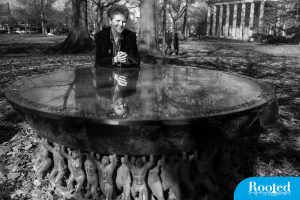María DeGuzmán has been contributing to research at Carolina for 24 years.

María DeGuzmán has worked for UNC-Chapel Hill for 24 years as a professor in the Department of English & Comparative Literature with specialization in Latina/o/x/e literatures and cultures, as well as general U.S. literature. She is the Eugene H. Falk Distinguished Professor of English & Comparative Literature and the founding director of the UNC Latina/o Studies Program.
What brought you to Carolina?
A community of many scholars with collaborative practices and public-spirited or civic-minded outlooks lured me to Carolina, as did the possibilities for rhizomorphic collaborations with other institutions.
I was also drawn by the changing demographics of North Carolina. Since the 1980s, the state has seen a huge increase in Latinx populations, placing it among the states with the highest percentage increase over the past four decades. That to me constituted an important reason to come to Carolina, as I was planning not only to offer individual courses in what was then designated “Latina/o Studies,” but, furthermore, to create a transdisciplinary program for that field.
How has your role here changed over the years?
My role at Carolina has remained remarkably consistent for two-and-a-half decades. I have taught Latina/o Studies courses and more general U.S. literature courses and have served for years as the director of the UNC Latina/o Studies Program. I am always engaged in research and writing. In addition to many scholarly articles, I maintain active interests in creative writing and photography, and have published three books: “Spain’s Long Shadow: The Black Legend, Off-Whiteness, and Anglo-American Empire;” “Buenas Noches, American Culture: Latina/o Aesthetics of Night;” and “Understanding John Rechy.” I am currently working on a fourth book at the intersection of environmental humanities and Latinx studies.
The main change in my role at Carolina has been one of perspective and scope. Years spent negotiating the challenges and opportunities around stronger support for the humanities has led me to take an increasingly transdisciplinary and inter-institutional approach to my own research, teaching, and service. The longer I have stayed in my roles, the more I view my contributions from a system’s perspective, analyzing how my research, teaching, service, and the Latina/o Studies Program I founded function in relation to the ecologies of the university, higher education, and our times.
What’s kept you at Carolina?
The many opportunities to work together on areas of mutual concern and benefit has kept me at Carolina, along with the flexibility and creative energy of my colleagues, and the relevance of the scholarship and teaching that I do in the context of the Southeast.
I conceive of and experience “the Southeast” not so much as part of “the South,” but as part of the “global South,” a region of the country with deep historical connections — or roots — to Africa, the Caribbean, the indigenous hemispheric Americas, the Americas south of the U.S./Mexico border, and to the circum-Atlantic entanglements between “the Americas,” and so many other regions of the globe.
What contribution are you most proud of?
The UNC Latina/o Studies Program. It is the first and oldest of its kind in the Southeast. This program has generated impressive contributions within our department and university, across the country, and beyond. The UNC Latina/o Cultures Speakers Series alone has brought over 110 scholars, creative writers, and performers to campus. Our undergraduate minors are engaged in exciting research and other creative endeavors. Our graduate students are involved in cutting-edge research, teaching, and program building. Those graduate students who have been closely associated with the program have gone on to get tenure-track jobs, highly sought-after postdoctoral positions, and choice program director positions at top universities.
What is a uniquely Carolina experience you’ve had?
In October 2005, one of the scholars invited by our UNC Latina/o Cultures Speakers Series flew down from Chicago to give a talk at Hyde Hall. She had some time to stroll around McCorkle Place, and she hugged the old trees, including the original Davie Poplar, a huge tulip poplar older than the university itself. Her action of respect and gratitude for these trees reminded me of one of the elements of campus that I have come to experience as “unique.”
These trees as living organisms, “be-ings,” that have witnessed hundreds of years of human history including English colonization, Native American land dispossession, slavery, civil war, lynching, other forms of mob violence, arson aimed at the trees themselves, and now human-induced climate change resulting in more frequent extreme weather events. When I walk back and forth beneath them, to class and to meetings and events on campus, I think not only of their visible parts — their roots, their trunks, their branches, their photosynthesizing leaves — but of their extensive root system holding together the soil upon which we tread. They communicate with one another in ways we have yet to truly understand and that unfold on timescales different from our own harried, distracted lives. I thank these trees for still standing.
Rooted recognizes long-standing members of the UNC-Chapel Hill community that have aided in the advancement of research by staying at Carolina. They are crucial to the UNC Research enterprise, experts in their fields, and loyal Tar Heels. Know someone we should feature? Nominate a researcher.